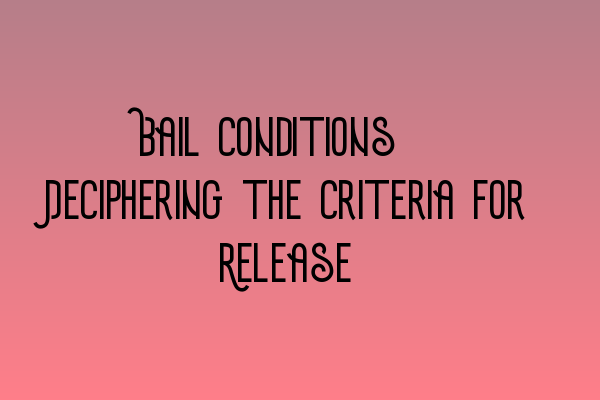Bail Conditions: Deciphering the Criteria for Release
As criminal defense solicitors at SQE Criminal Law & Practice Law UK, we understand how crucial it is to grasp the complexities of bail conditions. When a person is arrested, their release from custody may be subject to certain conditions that must be followed until their trial takes place. In this article, we will dive into the criteria used to determine these conditions and provide insights that will help you navigate this often bewildering process.

Understanding Bail Conditions
Before delving into the specific criteria for bail conditions, let’s first clarify what bail actually is. Bail is the temporary release of a person awaiting trial, ensuring their attendance in court. While bail is often granted, the court may require certain conditions to be met in order to safeguard against potential risks.
Criteria for release on bail vary case by case, taking into account factors such as the type of offense, the defendant’s criminal history, flight risk, and potential danger to the public. These conditions can include:
- The surrender of travel documents
- Residing at a specified address
- Reporting to a local police station
- Refraining from contacting certain individuals
- Abstaining from drugs or alcohol
- Electronic monitoring
The Criteria for Imposing Bail Conditions
The court determines bail conditions based on a thorough assessment of the individual’s circumstances. The primary objective is to strike a balance between protecting the public and ensuring the person’s right to liberty. Some key factors influencing the imposition of bail conditions include:
- The seriousness of the offense: More severe charges are more likely to result in strict bail conditions.
- Risk of flight: If the individual is considered a flight risk, stricter conditions may be imposed to prevent them from leaving the jurisdiction.
- Potential danger to the public: If the person poses a potential threat to public safety, the court may apply conditions to minimize that risk.
- Defendant’s character and criminal history: Previous convictions or a history of non-compliance may lead to more stringent bail conditions.
Seeking Legal Assistance
Understanding the criteria for release on bail and the potential conditions imposed can be overwhelming for anyone facing criminal charges. At SQE Criminal Law & Practice Law UK, our team of experienced solicitors can provide expert guidance and representation throughout the process.
If you are preparing for your SQE exams, make sure to check out our SQE 1 Practice Exam Questions and SQE 1 Practice Mocks FLK1 FLK2 to enhance your preparation. Additionally, we offer comprehensive SQE 2 Preparation Courses and SQE 1 Preparation Courses to ensure you are well-equipped for the exams.
Stay up-to-date with the latest SRA SQE exam dates by visiting our article on SRA SQE Exam Dates, as navigating the exam schedule is crucial for your progress.
Feel free to contact us today for all your criminal law needs. We are here to provide the expert legal advice and representation you deserve.
